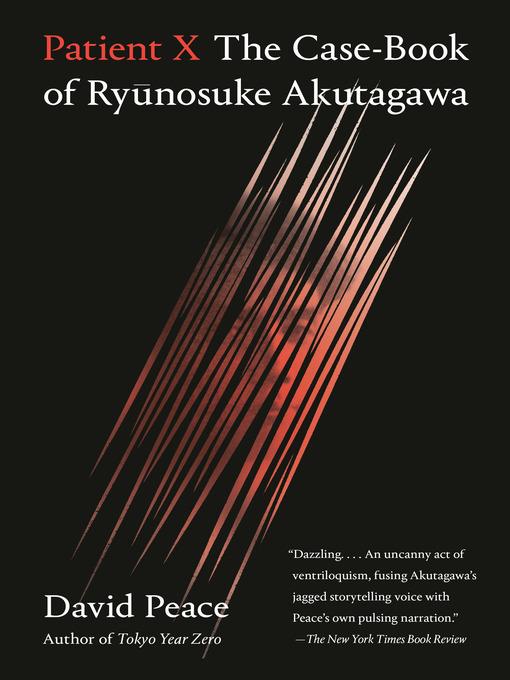
Patient X
The Case-Book of Ryunosuke Akutagawa
- اطلاعات
- نقد و بررسی
- دیدگاه کاربران
نقد و بررسی

July 1, 2018
An imaginative glimpse behind the curtain of a sheltered, definitively troubled writer of a century past."In the next life, if there is such a punishment, I wish to be reborn as sand." So says Ry?nosuke Akutagawa (1892-1927), the protagonist and reluctant center of Peace's (Red or Dead, 2014, etc.) latest venture into fact-based fiction--and not as much a departure from his procedurals as one might imagine, either. Presented as a series of sketches, the book proceeds from one turning point to another while emphasizing constant themes, opening with a parable that speaks to Akutagawa's idiosyncratic blending of Buddhism with Christianity; "I am not surprised," says a psychiatrist, archly, when Akutagawa travels to Nagasaki, the most Christian of all Japanese cities, though Akutagawa's interests turn out to be more nuanced than all that. Another constant is Akutagawa's obsession with death, beginning with that opening parable and continuing right up until his own suicide at age 35, having left behind a note complaining about his "vague sense of anxiety." A section of the book finds Akutagawa fascinated by the ritual death of a general and his wife after the death of the emperor, following an ancient though outlawed custom by which a retainer must accompany a master into the afterlife: "the newspapers were all agreed that General Nogi had committed junshi, following his lord into death, and then Shizuko had taken her own life, a true samurai wife following her husband into death." Akutagawa, Peace suggests, may just have been taking a place in that chain of suicides, all in obedience to an emperor whose death signaled the arrival of a "new age, a new era!" in which the writer would not comfortably fit. Though the book is a touch too pensive, it has an elegant poetry to it, even in the horrific passages depicting the great earthquake of 1923.Quiet homage to the progenitor of the modern Japanese short story.
COPYRIGHT(2018) Kirkus Reviews, ALL RIGHTS RESERVED.

July 9, 2018
In this sly, intermittently arresting novel, Peace (Occupied City) draws on the life and work of Ryu¯nosuke Akutagawa, a Japanese author “dogged with accusations of unoriginality,” to create a sui generis portrait. Peace has written two fictional biographies of British soccer coaches and turns to a more bookish subject here: a tortured writer best known for the short story that was adapted into the Akira Kurosawa film Rashomon. The novel is composed of 12 tales from various periods in Akutagawa’s life, beginning inside his mother’s womb, where he is unsure he wants to be “born into this world.” His noisy birth presages existential agonies: “you scream, alone, alone, you scream and you scream.” In similarly portentous style, Peace narrates the prolific writer’s artistic apprenticeship, spiritual struggle, growing fascination with Christianity, and suicide in middle age. Peace captures his subject’s febrile sensibility, the way literature forms and deforms him. Reading Poe, a major influence, makes Akutagawa feel “the fragility of his mind, so easily, easily fragmented and torn, shattered and ripped into so many, many pieces.” Akutagawa’s own writing is marked by “a frantic intensity, filling the decaying world of this supernatural story with horrific beasts.” Some of the tales capture Akutagawa’s mesmerizing energy, while others are wan, if devoted, homages, making this book most recommendable to fans of Akutagawa.

August 1, 2018
In another fictionalized memoir, award-winning Peace (Red or Dead?, 2014) turns his attention from British football fields to the early twentieth-century literary world of the highly influential modern Japanese short-story writer, Ryunosuke Akutagawa. The jump in subject reflects Peace's more than 20 years of living in Japan. His admiration for Akutagawa is evident in the numerous sources he scoured to construct the dozen linked stories that touch on the writer's major life events, psychology, and literary talent. Akutagawa is primarily known for writing the story that inspired Kurosawa's classic film, Rashomon (1950). Insights into Japan's pre-WWII history are relayed from a remarkably revealing point of view, given that Akutagawa was raised amid the struggle in Japan to hold onto tradition while coping with modernity and Western influence. Peace's writing in Akutagawa's voice is, at times, disorienting, but this form of literary devotion is not without reward. By combining history, oral tradition, surrealism, and a Poe-like grittiness, the always innovative Peace reimagines the life of a gifted writer who died young by his own hand.(Reprinted with permission of Booklist, copyright 2018, American Library Association.)




دیدگاه کاربران